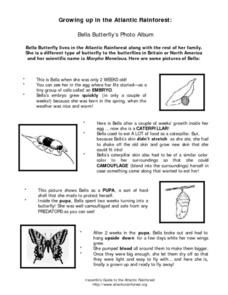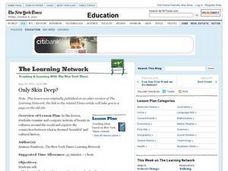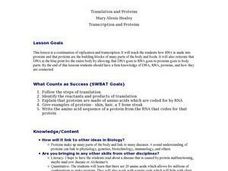University of Colorado
Patterns and Fingerprints
Human fingerprint patterns are the result of layers of skin growing at different paces, thus causing the layers to pull on each other forming ridges. Here, groups of learners see how patterns and fingerprints assist scientists in a...
Nuffield Foundation
Going up in Smoke
Don't let all your hard work go up in smoke. Pupils conduct an experiment to see the harmful effects of cigarette smoke. They observe how smoke changes the color of white wool and an indicator solution.
Curated OER
Easy Tie Die
Perfect for summer camp, an after school program, or your classroom, these instructions will make tie-dying a breeze! Simple instructions and helpful images make tie dying a fun and easy project. Tip: Have learners predict the outcome of...
Healthy Native Youth
Chapter 5: Learning About HIV/AIDS/STI's and Hepatitis Transmission
Middle schoolers delve deep into facts about HIV, AIDS, Hepatitis, and other STI's by way of discussion and a hands-on activity. Scholars ask and discuss questions anonymously using a Question Box. Two experiments showcase the...
Aquarium of the Pacific
Fish for a Day
A short video shows how a scuba divers' equipment relates to major parts of a fish. Learners draw two fish and identify what aspects are the same and which are different. The scholars then draw a scuba diver, making sure they provide all...
Curated OER
Makeup-- A Wealth of Minerals
Students examine how a variety of minerals are used in make-up. They discuss the minerals that are found in things like make-up, soap, shampoo, and toothpaste and determine where the minerals come from.
Curated OER
Skin: Skin Prints
Learners explore human anatomy by participating in a print experiment. In this human skin instructional activity, students define the term "epidermis" and utilize computer paper, pencils, tape and baby wipes to create a print of their...
Curated OER
UV Rays, sunscreen effectiveness
Students identify and define that invisible UV rays can be harmful. Then they explore the effects of UV radiation on objects that react UV rays and what products are most effective in blocking UV rays. Students also make predictions...
Curated OER
Periodic Table of the Elements
First graders discuss, at their level, the concept of elements making up all matter. They discover the story of Dimitri Mendeleev and his discovery of the Periodic Table of the Elements. They locate and color some of the most common...
Curated OER
Transportation Choices and the Environment
Students study statistics and charts pertaining to how transportation and other energy choices impact the environment. They participate in small group discussions regarding concerns for the future.
Roy Rosenzweig Center for History and New Media
American Indians and their Environment
People could take a page in ingenuity and survival from the Powhatans. Deer skins became clothes, and the members of the Native American group farmed the rich Virginia soil and hunted in its forests for food. Using images of artifacts...
Curated OER
Tamar Burris
Students explore genetics. In this life cycle lesson, students consider the meaning of "genes" and "heredity" as they watch a video about the topics. Students then research their own genetic make-up as they interview family members....
Arkansas Government
Creative Adventures with Literature - Whoever You Are
Celebrate our similarities and differences through multiple readings of Whoever you Are by Mem Fox. Readings are accompanied by a grand discussion, charts, creative art, dramatic, and music play to reinforce the uniqueness that is...
Curated OER
All the Colors We Are
Students make a hand print mural. In this painting lesson, students read the book All the Colors We Are and describe the color of their skin. Students learn how to mix paints to create various skin tones, create their personal...
Curated OER
Growing Up in the Atlantic Rainforest
In this science worksheet, students read and study pictures about the life cycle of a butterfly. Students then answer 10 questions about the passage. There is a word bank.
Education Outside
Natural Dye Tie-Dye
Up-cycle, or reprocess waste materials, into colorful tie-dye clothing or banners with an activity that uses fruits and vegetable juices as dye sources.
American Chemical Society
Forming a Precipitate
Can you mix two liquids to make a solid that is insoluble? Yes, you can, and pupils see this as the lesson uses more than one combination of liquids to form a solid. Through two teacher demonstrations and a hands-on activity,...
Curated OER
Only Skin Deep
Students examine and compare notions of beauty in cultures around the world and explore the connection between what is deemed 'beautiful' and cultural history. They Develop a "Beauty Around the World" collage representing beauty...
Curated OER
One of Our Five Senses - Touch
The wonderful world of Oobleck is entered in order to awaken your learner's sense of touch! As a warm up, learners put their hands in mystery bags in order to identify things that are wet, dry, hot, cold, hard, soft, rough, and smooth....
Curated OER
Translation and Proteins
Learners follow the steps of translation and identify the reactants and products of translation. They able to explain that proteins are made of amino acids which are coded for by RNA. Students are able to give examples of proteins--...
Curated OER
Understanding the Body, Day 3: Sexual Health & Hygiene
Ideal for secondary moderately disabled special ed students, this lesson focuses on personal hygiene and self-care. They discuss a case study and role-play to introduce the importance of good hygiene then discuss current appropriate...
Teach Engineering
Nanotechnology and Cancer Treatments
Information on the biomedical use of nanotechnology, specifically in the detection and treatment of cancer, is the focus of a lesson that seems like it is out of a science fiction novel. Pupils learn about electrophoresis, which is used...
Curated OER
What Does Life Look Like Under a Microscope?
Young scholars discover cells make up all living things. In this life science instructional activity, students investigate living organisms and the cells that create them. Finally the young scholars create a testable question, conduct an...
Curated OER
Made from Animals
Here is a terrific lesson for elementary schoolers on products that come from animals. In it, pupils discover that we get a lot more than just food from animals. After a class discussion and teacher-led demonstration, learners utilize...























